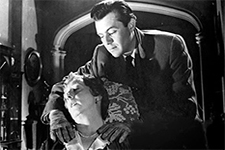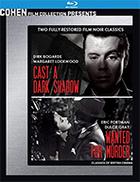Cast a Dark Shadow [Blu-Ray]
|

When he was cast as a handsome, psychopathic wife murderer in Cast a Dark Shadow, Dirk Bogarde was a matinee idol best known for his role as a medical student in the comedy Doctor in the House (1954), the previous year's most popular film at the British box office. Thus, his being cast as a calculating, amoral, and ruthless Bluebeard gives the film a particularly perverse twist. And, while modern viewers who are not familiar with Bogarde's career will obviously miss out on this nasty of-the-moment irony, they can still relish his slick, arch performance, which is full of all kinds of cutting glares and subtle smirks. When we first meet Bogard's Edward "Teddy" Bare, he is already married to Monica (Mona Washbourne), a much older woman over whom he dutifully dotes, primarily by plying her with booze. His actions are mechanical and contrived, and it is clear from the very first moments that he has no interest in her outside of her money and the posh life she can afford him, which includes a large mansion and a dedicated, but dim live-in maid named Emmie (Kathleen Harrison). Monica's lawyer, Phillip (Robert Flemyng), suspects what Teddy is up to, and he becomes particularly concerned when Monica enlists him to change her will so that everything goes to Teddy, rather than her sister who lives in Jamaica. In the first of the film's brutal twists, Teddy misunderstands what the change of the will means and decides to off Monica before she can do it, which leads to him inheriting only her house and nothing more. Teddy is not one to give up easily, and he quickly turns his attention to Freda Jeffries (Margaret Lockwood), a wealthy widow who married out of her working-class background, but still maintains its rough edges and sardonic humor. Unlike Monica, Freda has a healthy sense of skepticism and is all too aware of the allure of her money ("They want the moneybags but not the old bag!" she quips at one point). Teddy then finds himself being drawn to Charlotte Young (Kay Walsh), who he is trying to help find a house for an equestrian school. And, even though Teddy has been officially cleared of any wrongdoing in Monica's death, with no cash flow he is feeling the pressure to find a new victim, even as he knows that another wealthy wife and another "accidental" death will look highly suspicious. The plot for Cast a Dark Shadow was drawn from Janet Green's 1952 play Murder Mistaken, which ran in the U.S. as Gently Does It (Green also wrote a novelization in 1953 with Leonard R. Gribble, and it was adapted to British television in 1956, with Lockwood reprising her role as Freda). Green also had a successful career as a screenwriter, cowriting the groundbreaking drama Victim (1961), which also starred Bogarde as a gay lawyer being blackmailed, and John Ford's final film, 7 Women (1966). The screenplay by John Cresswell keeps things fairly straightforward, with little variation from the stageplay, which gives the film a slightly stagey quality (most of the action unfolds in only a handful of interior locations). Director Lewis Gilbert compensates for the strictures of the action by emphasizing extreme angles, intense foreground-background compositions, and dramatic chiaroscuro lighting right out of the expressionistic playbook. At times it feels a bit self-consciously moody and knowing, but the overall effect works in giving the material a sense of visual intensity. At the time, Gilbert was best known as a director of war dramas and crime films, with his greatest success of the era being Reach for the Sky (1956), about a pilot who loses both of his legs in an accident but still returns to active war duty. He would go on to direct the romantic comedy Alfie (1966) with Michael Caine, as well as three James Bond films: You Only Live Twice (1967), The Spy Who Loved Me (1977), and Moonraker (1979). He had already directed nearly a dozen features by the mid-1950s in a wide range of genres, and Cast a Dark Shadow benefits from his willingness to draw on the visual elements of film noir to expand the stage-bound nature of the story. The narrative drags a bit in the middle, but Bogarde is always on hand to inject some nasty energy, and the film's greatest accomplishment may be making his otherwise indefensible character simultaneously vile and pathetic.
Copyright © 2021 James Kendrick Thoughts? E-mail James Kendrick All images copyright © Kino Lorber / Cohen Media Group | |||||||||||||||||||||||||||||
Overall Rating:



 (3.5)
(3.5)
Subscribe and Follow
Get a daily dose of Africa Leader news through our daily email, its complimentary and keeps you fully up to date with world and business news as well.
News RELEASES
Publish news of your business, community or sports group, personnel appointments, major event and more by submitting a news release to Africa Leader.
More Information
